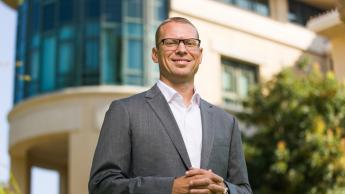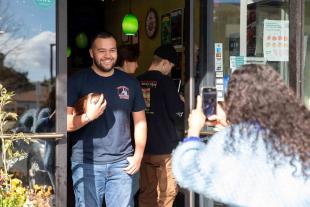Dean Damon Fleming Talks Intentional Risk and the Future of the Orfalea College of Business

Dean Damon Fleming joined the Orfalea College of Business in August, after serving as dean at the University of Memphis’ Fogelman College of Business and Economics. Before that, he spent nearly 13 years on the faculty of the Fowler College of Business at San Diego State University, where he earned his bachelor’s and master’s degrees. We caught up with him to discuss his path to Cal Poly, his plans surrounding experiential learning, and why he thinks calculated risk is essential for the future of business.
What about Cal Poly makes you excited for this new chapter in your career?
There’re two big things about Cal Poly that drew me in. The first is that I’m a product of the CSU system and my real purpose as an educator and as a dean is to make contributions back to the system that helped me get to where I am now. The second is Cal Poly’s amazing ethos — its commitment to Learn by Doing. It’s a philosophy that absolutely represents the future of business education. It’s a foundational part of the culture and the institution.
Your academic and professional background is in accounting. What drew you to that specific field of business?
Primarily it was the practical nature of accounting. I didn’t go to college right out of high school. I worked as a welder in a shipyard and when it came time for me to return to my education, I was very focused on career orientation and the idea that, when I earned my undergraduate degree, I was going to have a solid professional career. I saw that accounting is the anchor point for all businesses and I thought to myself, “I can go anywhere with this and have a career with that foundation.”
And what ultimately drew you to education?
I found my way into it serendipitously. As I was earning my master’s degree, the chair of the accounting department asked me if I’d be available to teach a course. It was about a week before the term began and I was at a point in my life where I’d adopted the philosophy of trying to say yes to anything that interested me and then figuring out how to do it.
I realized during that first term of teaching that being an educator was something I loved. Then through some wonderful mentorship, I realized that a career in education was going to enable me to match my strengths to the impact I’d be able to make.
My experience in higher education studying accounting was transformative. I was influenced, educated, and mentored by people who were inspirational to me. Then I realized I had the same ability to do that for others. I love what I do. I love the profession. I love being able to help educate, open doors, and connect people who want to get into the professional world of business.
What, to you, are the most fascinating aspects of business currently? What are some of the challenges?
Probably the most exciting aspect of business today is this intersection between human competencies and data competencies. Our world is full of so much data. The question then becomes how do we harness it and do something meaningful?
On the flip side, a lot of people look at data and think it’s making the human component of business less valuable. The reality is it’s making us more valuable because all that data is worth nothing if you can’t do something with it. Somebody needs to be telling the story. Somebody needs to be building the relationships. Somebody needs to be programming the AI and the other systems that are analyzing that data and searching for context.
The future is in how we blend those human and data assets. I think experiential learning is how you can take these two elements and find where they overlap on a Venn diagram. It’s saying, “Look, we’re going to blend these human and data components. We’re going to expose you to both and live them out in a real experience as part of your education.”
What other interests do you have outside of your profession, and how do those interests fuel your work?
I surf, and I train Brazilian jiu-jitsu. And they each get different levels of attention from me depending on the week. I also integrate these interests with my two teenage children as often as possible. For me, these activities keep me grounded and humble. There’s just some pure honesty in both.
The ocean doesn’t hold anything back and neither do my training partners. There’s a mental and a physical aspect to both surfing and jiu-jitsu. I love how they each create a situation where I need to focus purely on the present.
Turning back to Cal Poly and the Orfalea College of Business — talk about your vision for the college and its commitment to a hands-on curriculum.
My vision is an extension of where Cal Poly has been and where the Orfalea College of Business is headed — to become the world-class leader in experiential business education. Businesses already recognize that, if they want to hire new talent which is going to come in and on day one be ready to get to work, they should be looking at Cal Poly graduates.
Drilling down from there, we need to continue building a culture that’s based on accountability and trust and thinking mindfully about the ways in which we diversify our programming. How are we serving our first-time freshmen? How are we serving our transfer student population? How are we serving our graduate students? How are we serving our students from underserved backgrounds?
We need to be creating a space where everybody gets to show up exactly as they are — and that’s where the diversity, equity, and inclusion component of our mission comes in. It’s saying to everyone within our organization — faculty, staff, and students — to please bring their authentic selves to work every single day, while creating a place where that’s comfortable for everybody.
We also need to be mindful as we think through our opportunities. We’re going to be taking some calculated risks. We can’t just wait for things to happen. We need to make them happen. This is one of the most disruptive times in higher education in the last several hundred years and, by taking some measured risk — and being intentional about where those risks might take us — will be how we come into the next phase of higher education ahead of our competition.
Don't want to miss any cool Cal Poly News stories? Sign up for our monthly newsletter, the Cal Poly News Recap!



